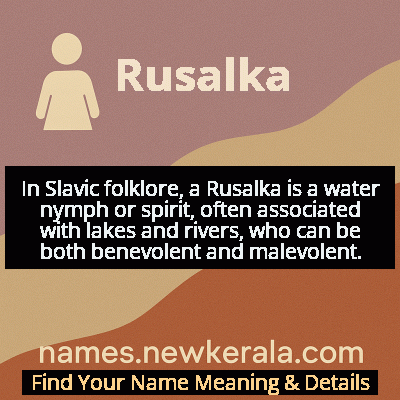Rusalka Name Meaning & Details
Origin, Popularity, Numerology Analysis & Name Meaning of Rusalka
Discover the origin, meaning, and cultural significance of the name RUSALKA. Delve into its historical roots and explore the lasting impact it has had on communities and traditions.
Name
Rusalka
Gender
Female
Origin
Czechoslovakian
Lucky Number
2
Meaning of the Name - Rusalka
In Slavic folklore, a Rusalka is a water nymph or spirit, often associated with lakes and rivers, who can be both benevolent and malevolent.
Rusalka - Complete Numerology Analysis
Your Numerology Number
Based on Pythagorean Numerology System
Ruling Planet
Moon
Positive Nature
Diplomatic, friendly, artistic, empathetic.
Negative Traits
Over-sensitive, moody, indecisive, prone to self-pity.
Lucky Colours
Green, cream, white.
Lucky Days
Monday.
Lucky Stones
Pearl, moonstone.
Harmony Numbers
1, 3, 4.
Best Suited Professions
Diplomats, mediators, caregivers, artists.
What People Like About You
Cooperative spirit, friendliness, artistic talent.
Famous People Named Rusalka
Rusalka (Opera Character)
Opera protagonist
Title character in Antonín Dvořák's famous opera 'Rusalka'
Rusalka Sokolova
Russian actress
Known for roles in Russian cinema and theater
Rusalka Domanović
Serbian artist
Multimedia artist exploring Slavic mythology
Name Variations & International Equivalents
Click on blue names to explore their detailed meanings. Gray names with will be available soon.
Cultural & Historical Significance
Extended Personality Analysis
Those named Rusalka are often characterized by their deep emotional intelligence and artistic sensibility, reflecting their mythological origins as beings connected to the emotional depths of water. They tend to be highly perceptive individuals who understand unspoken emotions and subtle social dynamics. This emotional awareness can make them excellent friends and confidants, though it may also lead to periods of introspection and solitude. Like water itself, Rusalkas can be adaptable and fluid in their approach to life, capable of navigating complex situations with grace. However, they also possess the potential for intense emotional currents—passionate, determined, and sometimes overwhelming in their convictions. Their dual nature often manifests as a balance between gentle compassion and strong personal boundaries, much like the rusalka who appears beautiful but can be dangerous when threatened. They typically value authenticity and depth in relationships, seeking connections that honor their complex nature rather than superficial interactions.
Modern Usage & Popularity
In contemporary naming practices, Rusalka maintains a niche but meaningful presence, primarily within Czech, Slovak, and Slavic communities where it serves as both a connection to cultural heritage and a statement of artistic appreciation. While statistically rare—appearing outside the top 500 names in most Slavic countries—it enjoys periodic revivals, often coinciding with notable performances of Dvořák's opera or renewed interest in mythological names. The name has gained some international attention through fantasy literature and gaming, where rusalki frequently appear as characters, introducing the name to global audiences. Among non-Slavic parents, it's typically chosen by those with specific interests in mythology, opera, or unique names with strong cultural foundations. Its usage remains most common in artistic and academic circles where its literary and musical associations are appreciated. The name's rarity ensures it maintains its distinctive character while its cultural significance provides depth and meaning beyond mere sound.
Symbolic & Spiritual Meanings
Symbolically, Rusalka represents the liminal spaces between worlds—the boundary where water meets land, human meets spirit, and conscious thought meets unconscious emotion. As a name, it carries the metaphorical weight of transformation and sacrifice, reflecting the mythological rusalka's journey between different states of being. It symbolizes the power of feminine intuition and emotional depth, serving as a reminder of nature's dual capacity for creation and destruction. The name also represents artistic inspiration drawn from deep emotional wells and the courage required to bridge different aspects of one's identity. In psychological terms, Rusalka can symbolize integration—bringing submerged aspects of the self to consciousness while maintaining connection to one's essential nature. For modern bearers, the name often becomes a personal metaphor for navigating complex emotional landscapes while maintaining authenticity and connection to one's roots and creative spirit.

